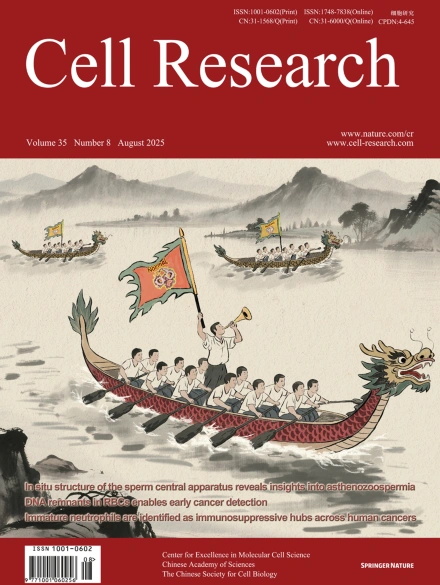
Advanced Search
Submit Manuscript
Advanced Search
Submit Manuscript
Volume 35, No 8, Aug 2025
ISSN: 1001-0602
EISSN: 1748-7838 2018
impact factor 17.848*
(Clarivate Analytics, 2019)
Volume 35 Issue 8, August 2025: 588-606
Human myelocyte and metamyelocyte-stage neutrophils suppress tumor immunity and promote cancer progression
Wei Liu1,† , Tao Shi2,3,† , Chun Lu1 , Keying Che2 , Zijian Zhang1 , Yuting Luo2 , Daniel Hirschhorn3,4 , Hanbing Wang2 , Shaorui Liu5 , Yan Wang5 , Shuang Liu1 , Haiqiao Sun1 , Jun Lu6 , Yuan Liu6 , Dongquan Shi6 , Shuai Ding7 , Heping Xu5 , Liaoxun Lu8 , Jianming Xu , Jun Xin9 , Yinming Liang10,11,* , Taha Merghoub3,4 , Jia Wei2,12,13,14 , Yan Li1,15,16
1National Resource Center for Mutant Mice and MOE Key Laboratory of Model Animal for Disease Study, Jiangsu Key Laboratory of Molecular Medicine, Model Animal Research Center, Department of Oncology, Nanjing Drum Tower Hospital, Affiliated Hospital of Medical School, Nanjing University, Nanjing, Jiangsu, ChinaTumor-infiltrating neutrophils (TINs) are highly heterogeneous and mostly immunosuppressive in the tumor immune microenvironment (TIME). Current biomarkers of TINs and treatment strategies targeting TINs have not yielded optimal responses in patients across cancer types. Here, we separated human and mouse neutrophils into three developmental stages, including promyelocyte (PM), myelocyte & metamyelocyte (MC & MM), and band & segmented (BD & SC) neutrophils. Based on this separation, we observed the predominance of human but not mouse MC & MM-stage neutrophils in bone marrow (BM), which exhibit potent immunosuppressive and tumor-promoting properties. MCs & MMs also occupy the majority of TINs among patients with 17 cancer types. Moreover, through the creation of a NOD/ShiLtJGpt-Prkdcem26Cd52Il2rgem26Cd22/Gpt (NCG)-Gfi1−/− human immune system (HIS) mouse model, which supports efficient reconstitution of human TIN, we found a significant increase of BM MCs & MMs in tumor-bearing mice. By comparing the single-cell RNA sequencing analysis results of human neutrophils from both BM and tumors, we found that CD63 and Galectin-3 distinguish MC & MM from neutrophil populations in cancer patients. Furthermore, we proposed a strategy with Fms-like tyrosine kinase 3 ligand to specifically induce the trans-differentiation of MCs & MMs into monocytic cells, and trigger tumor control in NCG-Gfi1−/− HIS mice. Thus, our findings establish an essential role of human MC & MM-stage neutrophils in promoting cancer progression, and suggest their potential as targets for developing potential biomarkers and immunotherapies for cancer.
https://doi.org/10.1038/s41422-025-01145-0